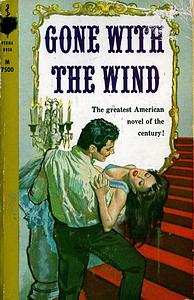Take a photo of a barcode or cover
slow-paced
Really loved this book; no wonder it's a highly praised classic. I learned a lot from this book i.e. southerners were democrats during the civil war (northern aggression). I went to a meeting in the middle of listening to the Civil war portion; my palms were sweating and my heart was racing. The description of the action was so well written I felt like I was there. Wow!
The complexity of the characters is unlike anything I have ever read. Scarlett is such a flawed, complex, brave and intelligent character. She is vain yet has the stubbornness to survive through anything. Rhett...oh boy I developed a crush on a fictional person. He is also intelligent, cunning, a moral bad boy, charming and passionate.
I was glad the story did not end at what seemed like a natural ending...Bonnie. I wanted more, I still want more. I can only dream to write as well as Margaret Mitchell. Amazing, books like this make me very happy.
The complexity of the characters is unlike anything I have ever read. Scarlett is such a flawed, complex, brave and intelligent character. She is vain yet has the stubbornness to survive through anything. Rhett...oh boy I developed a crush on a fictional person. He is also intelligent, cunning, a moral bad boy, charming and passionate.
I was glad the story did not end at what seemed like a natural ending...Bonnie. I wanted more, I still want more. I can only dream to write as well as Margaret Mitchell. Amazing, books like this make me very happy.
challenging
emotional
hopeful
informative
medium-paced
Plot or Character Driven:
Character
Strong character development:
Complicated
Flaws of characters a main focus:
Yes
The book; the story is absolutely amazing. It is hard to love characters that are so fundamentally wrong.
emotional
slow-paced
A masterpiece. Everything about this book is exceptional - the writing, the characterizations, the plot, the descriptions of the characters' feelings. It evokes a fully realized world populated by fleshed-out human characters. Yes, it's a little unsettling to see the race relations portrayed in the book, but as a reflection of the times it seems authentic. I saw the movie ages ago, and happily I've forgotten most of it, so I could take the book on its own terms. Highly recommended.
that was a rollercoaster
I have never watched the movie and this is not what I expected from the bits that I had seen when anyone else had it on. Just when you think things are going to settle down, something even more terrible happens. It was written in the 1930’s, but some of the women’s themes seem more modern. More interesting reflection on the Georgia history than I expected. It was really long. And of course, the race relations were problematic. But it kept my interest and provoked some thoughts on various themes.
I have never watched the movie and this is not what I expected from the bits that I had seen when anyone else had it on. Just when you think things are going to settle down, something even more terrible happens. It was written in the 1930’s, but some of the women’s themes seem more modern. More interesting reflection on the Georgia history than I expected. It was really long. And of course, the race relations were problematic. But it kept my interest and provoked some thoughts on various themes.
I swore through this whole book that when I finished I was going to throw it at the wall. Then I got to the end, and I couldn’t. The ending was too perfect.
So I just slowly closed it and set it on the shelf.
So I just slowly closed it and set it on the shelf.
I've seen the movie Gone With the Wind, conservatively guessing, more than a dozen times. I've never attempted to read the book, until now. I realized, approximately 850 pages in, that there is not much difference between the book and the movie. Of course, there are a few added characters, , so I have to admit that I quickly skimmed over the remaining 600 pages, in the expectation that at some point there would be a deviation in the plot between the book and movie. And there isn't.
It's strange to think that they were able to effectively encapsulate such a huge plot into a single movie, albiet a long movie. But this is a review of the book, not of the movie -- so . . .
Despite the blatant racism through out (I've never seen the n-word used as an adjective before, and Margaret Mitchell does it numerous times), it is a big beautiful epic novel. It is a book about the death of a civilization, the death of a way of life, and how certain characters were able to persevere and survive while others succumbed.
At its heart, and what makes the book amazing, to me, is the main character Scarlett, who is vain, self-centered, ignorant, pampered and annoying. Yet, I empathized with her. It is these qualities that help her persevere. She is a strong-willed woman who meets her match in the equally vain and self-centered Rhett Butler and we have the combustible properties of one of the most explosive romances in literary history.
There are many themes to the novel, including but not limited to: survival, the scars of war, familial bonds, and love and honor. It was penultimate novel of the Southern Renaissance, as the South built itself back up from the Civil War and Reconstruction. It was a romanticized image of Plantation life, which Mitchell must have felt was the ideal. And while she perpetuated myths of the role of freed slaves during Reconstruction (that of lazy bums sitting around waiting for hand outs and accosting white woman without fear of prosecution because they were being protected by that devilish fear mongering Freedman's Bureau), many have decided that when she wrote the book during the early to mid 1930's, those were the prevailing myths in the South, mainly because the extent of what really occurred during the years of Reconstruction were not yet known. Historian Richard Currant wrote of Margaret Mitchell, "No doubt it is indeed unfortunate that Gone with the Wind perpetuates many myths about Reconstruction, particularly with respect to blacks. Margaret Mitchell did not originate them and a young novelist can scarcely be faulted for not knowing what the majority of mature, professional historians did not know until many years later."
I've said that I enjoy reading classics as I find they are a snapshot in time. With Gone With the Wind, what you see is a novel that is akin to the Bible in many southern homes, a picture of what once was and how it was lost. And while the blatant racism is what many post modern critics seem to latch on to while criticizing the novel, there is much more to it than that. It is an author's love letter to her home -- this is what we once had, this is how it was lost, and this is how we continued to live and grew stronger.
Spoiler
children she had that were not included in the movie, characters that come and stay at Tara after the war that were left out of the movie, extended scenes that are cut down, like the burning of Atlanta and Scarlett's escape.It's strange to think that they were able to effectively encapsulate such a huge plot into a single movie, albiet a long movie. But this is a review of the book, not of the movie -- so . . .
Despite the blatant racism through out (I've never seen the n-word used as an adjective before, and Margaret Mitchell does it numerous times), it is a big beautiful epic novel. It is a book about the death of a civilization, the death of a way of life, and how certain characters were able to persevere and survive while others succumbed.
At its heart, and what makes the book amazing, to me, is the main character Scarlett, who is vain, self-centered, ignorant, pampered and annoying. Yet, I empathized with her. It is these qualities that help her persevere. She is a strong-willed woman who meets her match in the equally vain and self-centered Rhett Butler and we have the combustible properties of one of the most explosive romances in literary history.
There are many themes to the novel, including but not limited to: survival, the scars of war, familial bonds, and love and honor. It was penultimate novel of the Southern Renaissance, as the South built itself back up from the Civil War and Reconstruction. It was a romanticized image of Plantation life, which Mitchell must have felt was the ideal. And while she perpetuated myths of the role of freed slaves during Reconstruction (that of lazy bums sitting around waiting for hand outs and accosting white woman without fear of prosecution because they were being protected by that devilish fear mongering Freedman's Bureau), many have decided that when she wrote the book during the early to mid 1930's, those were the prevailing myths in the South, mainly because the extent of what really occurred during the years of Reconstruction were not yet known. Historian Richard Currant wrote of Margaret Mitchell, "No doubt it is indeed unfortunate that Gone with the Wind perpetuates many myths about Reconstruction, particularly with respect to blacks. Margaret Mitchell did not originate them and a young novelist can scarcely be faulted for not knowing what the majority of mature, professional historians did not know until many years later."
I've said that I enjoy reading classics as I find they are a snapshot in time. With Gone With the Wind, what you see is a novel that is akin to the Bible in many southern homes, a picture of what once was and how it was lost. And while the blatant racism is what many post modern critics seem to latch on to while criticizing the novel, there is much more to it than that. It is an author's love letter to her home -- this is what we once had, this is how it was lost, and this is how we continued to live and grew stronger.
A very mixed opinion of this book. I'm not sure why it is regarded as one of the greatest American novels. I found it a compelling read; I wanted to keep reading. But the characters are horrible people, most of all Scarlett. At no point does she ever think of anyone but herself and she never learns from her myriad mistakes or change course. Rhett is a fascinating but tragic character and even Melanie, for all her upstanding virtue is blinded by her own hopeful positivity.
There is racism dripping from every page which is to be expected of a book set in the south during and immediately after the Civil War. But there are also so many narrator comments about how slavery is good for all involved, glorifying the ways of the south prior to the Civil War, and vile and animalistic depictions of every black character. Racism is celebrated by the author.
This was an engaging read but one I cannot in good conscience ever recommend to anyone.
There is racism dripping from every page which is to be expected of a book set in the south during and immediately after the Civil War. But there are also so many narrator comments about how slavery is good for all involved, glorifying the ways of the south prior to the Civil War, and vile and animalistic depictions of every black character. Racism is celebrated by the author.
This was an engaging read but one I cannot in good conscience ever recommend to anyone.



